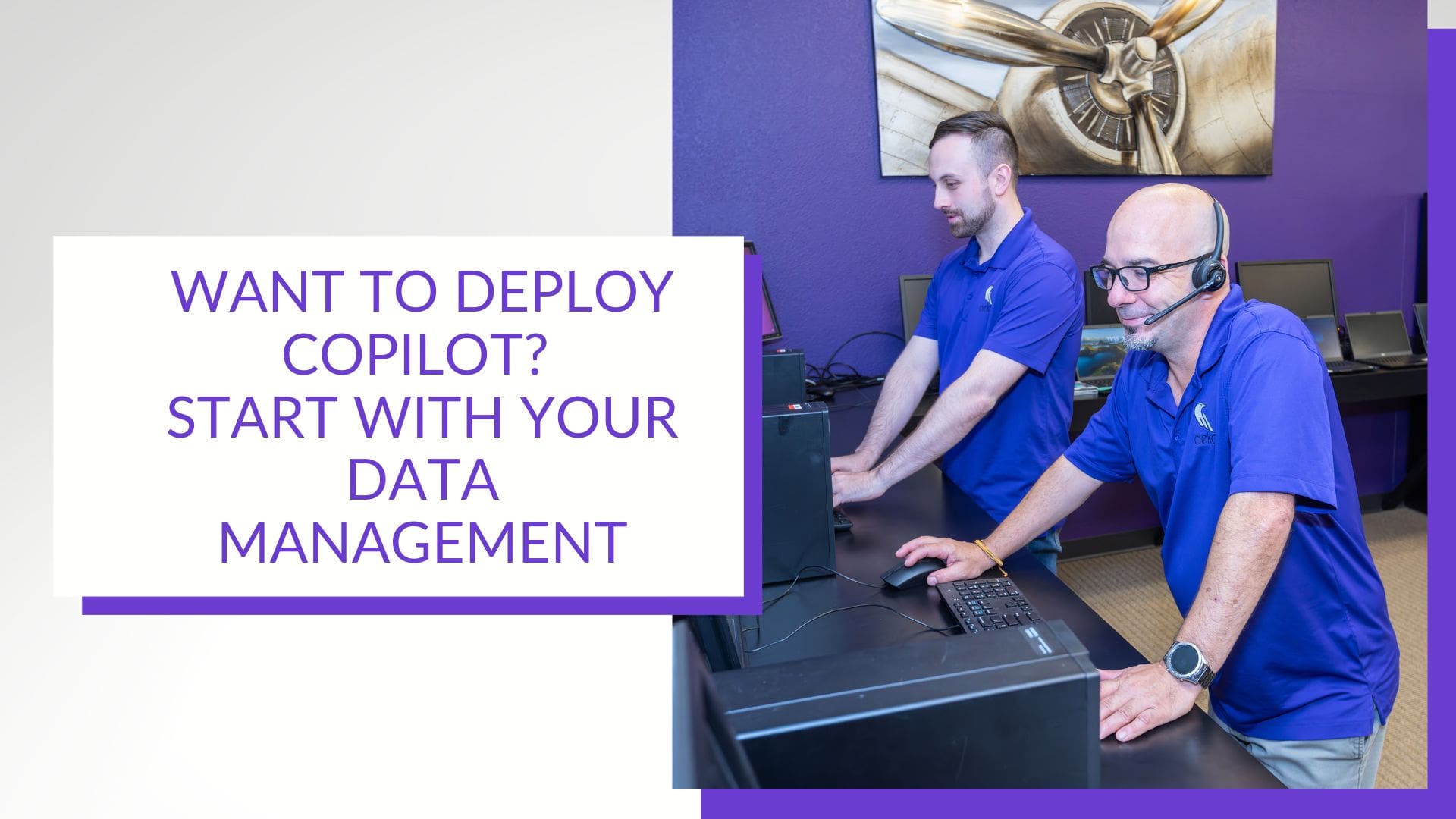
Want to Deploy Copilot? Start with Your Data Management
The lifeblood of your business? Data, of course! It brings your organization insights, driving decision-making and shaping the success of your organization. However, you aren’t alone if the amount of data you can obtain is overwhelming. Inconsistent formatting, siloed databases and scattered spreadsheets all create a nightmare data management situation that only hinders your organization’s ability to leverage the assets’ value. Not to worry, our managed IT services can help. In five short minutes, you’ll have all you need to go from chaotic clutter to top-tier data management.
The Pitfalls of Poor Data Management
Unfortunately, there are quite a few consequences of neglecting data management, here’s how doing it poorly can hurt your organization:
Insufficient Operations
Did you know that 73 percent of workers spend about one to three hours a day trying to find the right data? The struggle to find the data your team members need can be a huge waste of resources and time. Manual processes for data analysis can become error-prone and cumbersome, hurting your organization’s efficiency.
Decision-Making
Flawed insights can come from inconsistent or inaccurate data. This can inadvertently lead to making decisions on faulty information, which can lead to holding back on strategic initiatives or jeopardizing growth opportunities.
Compliance Issues
Data privacy regulations are becoming increasingly stringent, which means poor data management can make it more difficult to comply with regulations. Not complying with regulations leads to reputational damage and heavy fines.
Reduced Customer Satisfaction
If your customer data is inaccurate, it can only lead to poor customer experiences. One example is if your contact information is incorrect, it will hinder communication. Irrelevant marketing campaigns can come from outdated customer preferences.
Key Principles of Effective Data Management
You need to develop a robust data management strategy, as it can unlock the true potential of your data. Here are some key principles to note:
- Data governance: Ensure clear ownership and accountability for data by defining specific roles and responsibilities for its creation, storage, access and maintenance.
- Data quality: You’ll need to create data quality measures and ensure data accuracy, completeness and consistency. You’ll remove errors and inconsistencies when you regularly use data cleansing processes.
- Data standardization: To ensure consistency in how your organization formats, defines and stores data, you should establish data standards. These standards should be the same across all systems and departments.
- Data security: To safeguard your sensitive data, put strong security measures in place. IT will protect your data from breaches, data loss and unauthorized access. Critical security measures include access controls, encryption and regular security audits.
- Data accessibility: For authorized users, you’ll want to ensure data is easily accessible. Your team members will need it to do their duties. Streamlining data access processes ensures users have the tools and training to locate and use the data effectively.
Strategies for Effective Data Management
You’ll need a strategic plan to transform your company’s data management approach. Use these actionable strategies:
- Conduct a data inventory: Catalog all the data your company gathers, stores and utilizes. Determine the purpose of each data set and how it serves the organization.
- Invest in data management tools: There are data management technological solutions. You’ll want to find features like data visualization, warehousing and cleansing.
- Develop data policies and procedures: If you don’t have your data management procedures and policies documented, it’s time to do so. You’ll want to outline user access protocols, data collection practices and data retention requirements.
- Foster a data-driven culture: Emphasize the importance of responsible data usage and data quality to foster a data-driven culture within your organization. To do this, train your employees in best practices and empower them to leverage data for informed decision-making.
- Embrace continuous improvement: Data management is an ongoing process; review your practices regularly and identify areas for improvement. As your company’s data needs evolve, adapt your strategies and processes.
The Benefits of Effective Data Management
These best practices will unlock a world of benefits for your organization:
Enhanced Operational Efficiency
To increase productivity and operational efficiency, use good data management practices. Here’s how it helps your organization:
- Streamline workflows
- Improve data access
- Enjoy accurate data analysis
Data-Driven Decision Making
When your data is reliable, it will empower informed decision-making across your entire organization. Improved outcomes and a competitive advantage come from these data-driven strategic initiatives.
Improve Customer Experience
To personalize your marketing campaigns, you’ll need accurate customer data. This also helps create targeted offerings and great customer service interactions. If you want to increase your response times for support issues, make sure you have up-to-date customer data.
Reduced Risk of Compliance Issues
Want an easier time meeting data privacy regulations? You guessed it, robust data management practices minimize legal risks and potential fines, while also making it easier to put data security policies in place.
Unleash the Power of Data Analytics
Fuel powerful data analytics with clean and organized data that gains deeper insights into things like:
- Customer behavior.
- Operational performance.
- Market trends.
CoPilot Can Help With Data Management
Another great way to manage your organization’s data is with Microsoft’s CoPilot. It’s a powerful way to gain insights on data quickly, data modeling, database development and more. AI is only becoming more prevalent in businesses as it can also make your organization more efficient and productive.
Get Help Setting Up a Data Management System
Poor data management doesn’t need to bog your organization down. Let our team of experts help you set up an effective management process to put the power of data at your fingertips. Book a meeting with us today to get started.
Are you aware of the most common cyberattack methods?
Did you know there are over 3.4 billion phishing emails sent every day? Phishing and other cybercriminal behavior are a lot more common than you’d think.
Our free “Phishing, Smishing, Vishing, Pharming? A Cyberattacks Guide” will inform you about cyberattack methods and give you the latest in data security tips.

